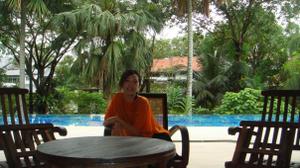ESP Biography
HAERIN SHIN, PhD student in the comparative lit program
|
Major: Comparative LIterature College/Employer: Stanford University Graduate Division Year of Graduation: N/A |

|
Brief Biographical Sketch:
Born and educated in Korea, currently in the ph.d. program at Stanford Univ. (studying contemporary novels in Korea, Japan and the U.S.) Past Classes(Clicking a class title will bring you to the course's section of the corresponding course catalog)L596: Speculations Gone Wild: The World of SciFi and Fantastic Fiction in Splash! Fall 2009 (Oct. 10 - 11, 2009)
Ever watched Star Trek? How about all those robot or superhero cartoons that used to air on Saturdays, such as Transformers or He-Man? What about Harry Potter or Dark Knight? We are surrounded by science fiction, fantasies, and tales of the supernatural from the very dawn of childhood, although we may not be consciously aware of this fact. These genres have been considered as having one foot buried in far-fetched fantasies (involving aliens, space ships or dragons!) and the other firmly planted in the realm of conventional, "aesthetically appreciated" art. We can likely agree that these stories are entertaining, but what about their meaning, their values?
Let's stop for a second and recall all those things that don't strictly fall into the category of the "realistic portrayal of the world" in our daily lives. They're nearly omnipresent, in ads, movies, books… all kinds of media teem with references to things that aren't always "real." What's the fascination here? Why such abundance if they're mere far-fetched fancies? In our class, we will use various references to elements of the "unreal" in various kinds of media, which may apply to any form of textual/visual representation (including film, literature, graphic novels, advertisements or even simple pictures or photos), as a way of preparing yourselves for critical analysis and research.
|
|
